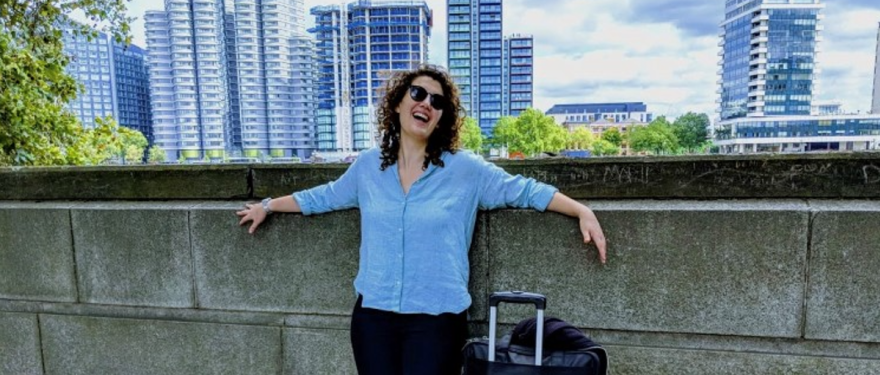Tell us about your life before HBS.
I grew up in Antwerp, Belgium as part of the Jewish community. Having four grandparents who are Holocaust survivors, I felt it was important to experience life in Israel, and so, after taking a gap year, pursued a joint degree in Life Sciences and Psychology at The Hebrew University of Jerusalem, focusing on neuroscience. There I was part of two academic labs, one focusing on the impact of stress on the immune system, and the other on translational bioengineering. Looking at my long-term goals, which include innovation in the field of life sciences, I understood that it was critical to gain practical experience outside of academia. I decided to join McKinsey & Company, motivated to attain the best possible position to provide me with the essential business experience I lacked. That was the start of a multiyear journey servicing clients across the health care value chain in Israel and Western Europe, an experience that culminated in supporting the COVID-19 vaccine response as part of the McKinsey Social Sector Hub in Geneva.
Why the MS/MBA Biotechnology: Life Sciences degree?
Initially I was not thinking about going to business school. I learned a lot at McKinsey about business and strategy, but I really missed the science. The plan was to pursue an MS in biomedical engineering, until a few colleagues sent me press articles about the new Harvard joint degree, through which you can pursue both the MBA and an MS in Biotechnology. It was such an intuitive fit, one where I could leverage my previous experiences and improve my fluency in both the languages of business and science, to ultimately drive innovation in a sustainable and impactful way.
Being part of the inaugural cohort for over a year now (Class of 2022), I see three main benefits of pursuing the MS/MBA over an MS or MBA individually: a strong like-minded community, unparalleled exposure to leaders in industry and academia, and increased fluency not only in science but also in the business of science. I am looking forward to continuing to be part of this supportive, stimulating, and growing community, especially as the new cohorts come in.
What was something you did not expect coming into HBS, but found?
The openness of the students and the supportive community. The people I have interacted with and become friends with at HBS have challenged not only the way I think about my professional life, but also about my personal life - whether it is discussing more delicate societal issues within the classroom or outside, unexpectedly bonding over deep life experiences with people from South Korea or South Carolina, learning about what a wedding looks like in Nigeria, discussing Middle East politics with Syrian and Lebanese classmates, hiking in Arizona with close friends, or treasuring the sunny Boston days on the beautiful HBS campus.
How is the MS/MBA preparing you for a career in health care and the life sciences?
First, through the formal academic experience. The case method at HBS forces you to be fully present, reactive and able to communicate your opinions in a very clear way. The real beauty of the case method is listening to the opinions of fellow students, who come from such diverse backgrounds and enable me to look at problems through a manifold of new lenses. On the MS side, I get to tap into the scientific way of thinking again, but perhaps more importantly, I get to learn how to enable disruptive scientific developments to achieve positive impact at a large scale.
Second, through the informal academic experience, which enables me to put theory into practice and to further develop my understanding in areas I am passionate about. For example, last year I had the chance to coordinate a panel featuring senior leaders of the pandemic response from the UK, Nigeria, and India. I got to work closely with an HBS Professor, and we are currently in the process of writing a case together with one of the panelists, which could potentially serve as part of the future MBA curriculum.
Third, through developing new skills in a low-risk environment. One of my major goals coming into HBS was exploring the world of life science entrepreneurship. Through Nucleate, a student-run biotech incubator, I met a PhD candidate at MIT with whom I have been exploring a tough tech venture for most of the last year. It’s a roller-coaster ride on so many levels, but I am enjoying every thrill and can feel how I am starting to develop the right reflexes and the ability to ask the right questions in entrepreneurship. Having access to HBS resources and very experienced HBS faculty, as well as being in Boston, a major life science hub, both contribute to this unique sense of safety and adventure.
Lastly, through the student and alumni community. It has been very powerful to be able to test out multiple career and life paths with people who have direct experience in sub-segments of the health care and life industry, and to see how generous people have been with their time. This also comes across in my internship experience, where I explored business development at Genentech. An HBS alumna helped me narrow down what I wanted to do and made sure I understood how to best prepare myself for the recruiting process. I am now following the same process as I think through my short- and mid-term path for full-time work. My hope is to be able to pay it forward now as a current student, but also as an alumna in the (sadly) not too distant future.

